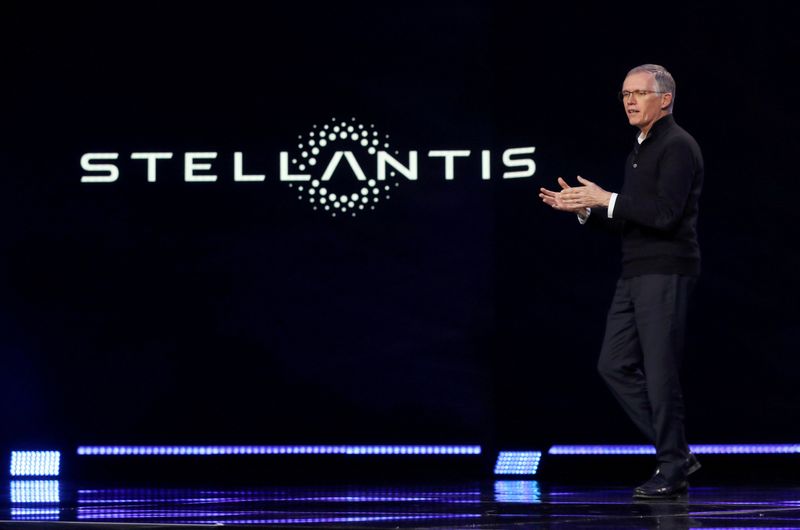By Giulio Piovaccari and Alessandro Parodi
MILAN (Reuters) – Outgoing CEO Carlos Tavares clashed with Stellantis’ (NYSE:) board over his plans to quickly turn around the ailing U.S. company by cutting costs, rather than focusing on its long-term strategy, they said investors and bankers familiar with the matter on Monday.
Shares in the Jeep, Fiat The (BIT:) and Peugeot (OTC:) manufacturer fell as much as 10% to reach the lowest level since July 2022, as investors worried about the vacuum left at the top of the world’s No. 4 automaker following the resignation of Tavares Sunday.
Stellantis is struggling to clear overcapacity and bloated inventories in its key North American market at a time when global demand remains weak and competition from Chinese rivals, especially in electric vehicles, is increasing.
In addition to the problems in the U.S., the company’s focus on raising prices among its mass-market brands has also driven customers away from its other key market, Europe.
Stellantis had said shortly after a shock profit warning in September that Tavares would retire in early 2026, at the end of his current term. The process to select a new CEO was initially expected to be completed in the last quarter of next year.
Interviews with half a dozen shareholders, bankers and analysts show how quickly disagreements have grown between Tavares – long one of the auto industry’s most respected executives – and the board over how to resolve the crisis.
A senior investment banker briefed on the matter said Monday that the board was growing concerned about Tavares’ turnaround strategy.
In recent months, and with just over a year to go, the CEO had mainly focused on cost savings, the banker said. The board was concerned that this would lead to quality problems, but also limit the company’s ability to develop and design new models.
Customers and dealers were furious about Tavares’ strategy, the banker said.
The launch of some key models, such as the new version of the popular mid-size SUV Peugeot 3008 and the low-cost city car Citroen C3, with its electric version e-C3, has been delayed.
A source familiar with the matter told Reuters on Sunday that tensions were rising because the board felt Tavares was focused on finding short-term solutions to save his reputation rather than working in the best interests of the company.
Stellantis declined to comment and Reuters could not reach Tavares on Monday.
VIEWPOINTS
Tavares’ cost cuts had especially hurt his relationships with U.S. dealers and the U.S. union United Auto Workers, analysts said.
In a September 10 letter to Tavares, Kevin Farrish, president of the Stellantis national dealer council, complained that the pursuit of short-term profits meant a “rapid degradation” of the Jeep, Dodge, Ram and Chrysler brands, adding: “You have created this problem.”
The UAW has threatened to attack the automaker over delayed investments, prompting lawsuits from Stellantis accusing the union of breach of contract.
Another sticking point for investors was Tavares’ tough approach to the European Union’s upcoming tougher emissions targets at a time of declining electric vehicle sales, said Massimo Baggiani, founder of Niche Asset Management and Stellantis shareholder.
It “scared” investors and major shareholders, he said.
CEO Tavares repeatedly reaffirmed Stellantis’ commitments to meet EU targets and said last-minute regulatory changes or delays as proposed by the European car lobby ACEA (BIT:), were dishonest.
New rules known as Corporate Average Fuel Economy (CAFE) from January 1 will require around 21% of the company’s total revenue to come from electric vehicles by 2025.
If it doesn’t meet the target, it will have to pay other companies with lower emissions to pool emissions and reduce their average carbon emissions, or pay a fine.
Stellantis’ current EV sales mix in the EU is approximately 12%.
Europe chief Jean-Philippe Imparato warned in an interview with Italian newspaper Milan Finanza last month that fines could reach as much as 3 billion euros ($3.1 billion) if the country fails to comply.
Tavares’ premature departure, despite his determination to turn the tide before 2026, shows how serious the group’s problems are, said Bernstein analyst Stephen Reitman.

“It points to what we have been saying for a long time: that the problems run very deep and that they cannot simply be solved now,” he said.
($1 = 0.9519 euros)


